英语写作基础教程(effective Sentences 1)
英语写作:Effective Sentences

She is absent today, because she doesn’t feel well.
Part 2:Structure
Practice: Simple, compound, complex or compound-complex sentence?
1.China is willing to work with Italy to contribute to international cooperation in combating the epidemic and to the construction of a Health Silk Road.
1 Simple 简单句 2 Compound 并列句 3 Complex 复合句 4 Compound-Complex
并列复合句
Part 2:Structure
Practice: Simple, compound, complex or compound-complex sentence?
1.China is willing to work with Italy to contribute to international cooperation in combating the epidemic and to the construction of a Health Silk Road.
Part 1:Function
1 Declarative sentences 陈述句 2 Interrogative sentences 疑问句 3 Imperative sentences 祈使句 4 Exclamatory sentences 感叹句
2
Structure
Part 2:Structure
《英语写作基础教程》讲义-英语写作基础教程
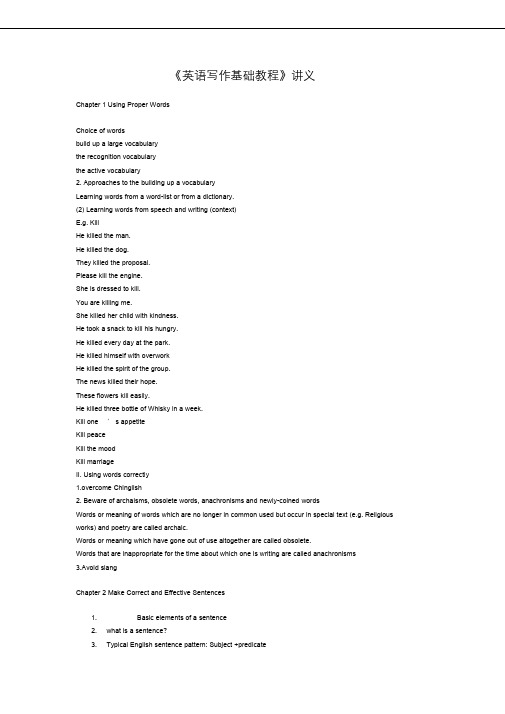
《英语写作基础教程》讲义Chapter 1 Using Proper WordsChoice of wordsbuild up a large vocabularythe recognition vocabularythe active vocabulary2. Approaches to the building up a vocabularyLearning words from a word-list or from a dictionary.(2) Learning words from speech and writing (context)E.g. KillHe killed the man.He killed the dog.They killed the proposal.Please kill the engine.She is dressed to kill.You are killing me.She killed her child with kindness.He took a snack to kill his hungry.He killed every day at the park.He killed himself with overworkHe killed the spirit of the group.The news killed their hope.These flowers kill easily.He killed three bottle of Whisky in a week.Kill one ’s appetiteKill peaceKill the moodKill marriageII. Using words correctly1.overcome Chinglish2. Beware of archaisms, obsolete words, anachronisms and newly-coined wordsWords or meaning of words which are no longer in common used but occur in special text (e.g. Religious works) and poetry are called archaic.Words or meaning which have gone out of use altogether are called obsolete.Words that are inappropriate for the time about which one is writing are called anachronisms3.Avoid slangChapter 2 Make Correct and Effective Sentences1. Basic elements of a sentence2. what is a sentence?3. Typical English sentence pattern: Subject +predicateCoach Dietz exemplified this behavior by walking offthe field in the middle of a game , l eaving her team ata time when we needed her.I need to find a new roommate. I need to find a new roommatehave now isn't working out too well have now isn't working out too well.Well done! What a day!George in Beijing ? Susan a singer?To return from our digressionA run-on sentence consists of two or moresentence —or a semicolon.)Comma splices join two complete sentences with a comma.”and “he needed to buy eggs for Joey went to the grocery store, for he needed to buy eggs for supper.3. The position of modifiers(2) Reference of person(3) Vague ComparisonIV. Coherence(5) The balanced sentenceVI. The kinds of sentencesIn structure: (1) a simple sentence(2) a compound sentence(3) a complex sentence(4) exclamatoryRhetorically:Loose SentencePeriodic sentenceThe balance sentenceThe cumulative sentenceThe anticlimactic sentenceRhetorical questionA. Declarative, Interrogative, Imperative and Exclamatory SentencesAccording to their use, sentences are declarative, interrogative, imperative or exclamatory. A declarative sentence makes an assertion or a statement. An interrogative sentence asks a question. An imperative sentence expresses a command or a request. An exclamatory sentence expresses a strong feeling or emotion, such as surprise, pain, or joy.B. Simple, Compound, Complex, and Compound-Complex SentencesAccording to their structure, sentences are simple, compound, complex, or compound-complex.SIMPLE SENTENCEA simple sentence has only one subject and one predicate-verb, but it may contain more than one object, attribute or adverb. Short simple sentences are usually emphatic; they have special clarity and provide variety when used with longer sentences.e.g. 1. He is a good student.2. Would you tell the way to the Astor Hotel?3. Do not disturb your brother!4. When did you join the club?5. What a lovely girl she is!COMPOUND SENTENCEA compound sentence consists of two or more independent clauses (or simple sentences) related toeach other in meaning, and linked by a coordinating conjunction (and, but, or, so, for, etc.) or by a semicolon without a conjunction. Coordinated ideas should be compatible and roughly equal in importance, or take shape one by one in orderly sequence.e.g. 1. The heavy rain started suddenly, so we stopped planting the trees.2. Jack wanted to go swimming, but his wife wanted to go shopping.3. Her son studies History; her daughter majors in Chemistry.COMPLEX SENTENCEA complex sentence contains one main (or principal) clause and one or more dependent (or subordinate) clauses, with a connective word denoting the relation between the two parts. The dependent clause mayplay the part of a subject, an object, a predicative, an attribute, or an adverbial in the main clause. As arule, the major idea is expressed in the main clause and the idea or ideas of lesser importance in the subordinate clauses.e.g. 1. The government banned the high-blood-pressure pills because they produced side effects.2. Although the shop advertised same-day service, my car was not ready for three days.3. These apple trees, which my father planted three years ago, have not borne any fruit.COMPOUND-COMPLEX SENTENCEA compound-complex sentence contains at least two main clauses and at least one dependentclause —a combination of a compound and a complex sentence.e.g. 1. After I returned to school following a long illness, the math teacher gave me make-up work, but the history teacher made me drop her course.2. When the power line snapped, Tom was listening to the stereo, and Teresa was reading in bed.3. Lisa disliked walking home from the bus stop, because the street had no overhead light and it was lined with abandoned buildings.C. Loose and Periodic SentencesA loose sentence puts the main idea before all supplementary information; in other words, it puts first things first, and lets the reader know what it is mainly about when he has read the first few words. The reverse arrangement makes a periodic sentence: the main idea is expressed at or near the end of it, and it is not grammatically complete until the end is reached. The reader does not know what it is mainly about until he finishes reading it.Compare:1. She was offered a professional contract after winning the Olympic gold medal for figure skating, according to newspaper reports.2. According to newspaper reports, after winning the Olympic gold medal for figure skating, she was offered a professional contract.The main idea of both sentences is the fact that she was offered a professional contract. This idea is put at the beginning of the first sentence and at the end of the second, thus making one a loose sentence and the other a periodic one. Besides, the first part of the first sentence is complete in structure, but that of the second are only prepositional phrases and cannot be called a sentence without the second part. Loose sentences are easier, simpler, more natural and direct; periodic sentences are more complex, emphatic, formal, or literary.D. Short and Long SentencesShort sentences are usually emphatic, whereas long sentences are capable of expressing complex ideas with precision, because it may contain many modifiers. Short sentences are suitable for the presentation of important facts and ideas, and long sentences for the explanation of views and theories, or the description of things with many details.The following passage, which describes how a man saved a drowning girl, makes good use of short sentences.He crouched a little, spreading his hand under the water and moving them round, trying to feel for her. The dead cold pond swayed upon his chest. He moved again, a little deeper, and again, with his hands underneath, he felt all around under the water. And he touched her clothing. But it evaded his fingers. He made a desperate effort to grasp it ⋯He laid her down on the bank. She was quite unconscious and running with water. He made the watercome from her mouth, he worked to restore her. He did not have to work very long before he could feelthe breathing begin again in her; she was breathing naturally. He worked a little longer. He could feel herlive beneath his hands; she was coming back. He wiped her face, wrapped her in his overcoat, lookedround into the dim, dark gray world, then lift her and staggered down the bank and across the fields.---D. H. LawrenceIn contrast to short sentences, long sentences are particularly useful for presenting a set of complex,interlocking ideas. They are common in legal, political and theoretical writing, which depends onmodification for accuracy. In fiction long sentences are sometimes used to describe a person, a thing or ascene.Mrs. Chalmers was kind of fat and her hair was pretty blond and her complexion was soft and pink andshe always looked as though she had been in the beauty parlor all afternoon. She always said “My, you’re getting to be a big boy ”to Peter when she met him in the elevator, in a soft voice, as though shewas just about to laugh. She must have said that fifty times by now. She had a good, strong smell ofperfume on her all the time, too.Mr. Chalmers wore pince-nez glasses most of the time and he was getting bald and he worked late at hisoffice a good many evenings of the week. When he met Peter in the elevator he would say, “It ’s getting colder, ”or “It ’s getting warmer, ”and that was all, so Peter had no opinion about him, except that helooked like the principal of a school.But now Mrs. Chalmers was on her knees in the vestibule and her dress was torn and she was crying andthere were black streaks on her cheeks and she didn ’t look as though she ’d just come from the beauty parlor. And Mr. Chalmers wasn ’t wearing a jacket and he didn ’t have his glasses on and whaht a h d a i r hewas mussed all over his head and he was leaning against the Early American wallpaper making thisanimal noise, and he had a big, heavy pistol in his hand and he was pointing it right at Mrs. Chalmers.---Irwin ShawAlthough series of short and long sentences can both be effective in individual situations, frequentalternation in sentence length characterize much memorable writing. After one or more long sentencesthat express complex ideas or images, the pitch of a short sentence can be refreshing. Look at thefollowing example:We are now so easily misled by vision. Most of the things before our eyes are plainly there, notmistakable for other things except for the illusions created by professional magicians and, sometimes,the look of the light of downtown New York against a sky so black as to make it seem a near view ofeternity. Our eyes are not easy to fool.Similarly, a long sentence that follows a series of short ones can serve as a climax or summing-up thatrelaxes the tension or fulfills that expectation created by the series, giving readers a sense of completion.Here is a good example:We now have, as a result of modern means of communication, hundreds of words flung at us daily. Weare constantly being talked at, by teachers, preachers, salesmen, public officials, and motion-picturesound tracks. The cries of advertisers pursue us into our very home, thanks to the TV —and in somehouses the TV is never turned off from morning to night. Daily the newsboy brings us, in large cities, from thirty to fifty enormous pages of print, and almost three times that amount on Sunday. We go out and get more words at bookstores and libraries. Words fill our lives.VII. sentence varietyChapter 3 Developing ParagraphsChapter 3 Developing Paragraphs1. Basic structure of paragraphsTopic sentence:It states the main idea of the paragraph. It not only names the topic of the paragraph, but it also limits the topic to one or two areas that can be discussed completely in the space of a single paragraph. The specific area is called the Controlling idea.Supporting sentences:It develops the topic sentence. That is, they explain the topic sentence by giving reasons. Some of the supporting sentences that explain the topic sentences about gold are.Concluding sentence:It signals the end of the paragraph and leaves the reader with important point to remember.E.g.There are three reasons why Canada is one of the best countries in the world. First, Canada has an excellent health care system. All Canadians have access to medical services at a reasonable price. Second, Canada has a high standard of education. Students are taught by well-trained teachers and are encouraged to continue studying at university. Finally, Canada's cities are clean and efficiently managed. Canadian cities have many parks and lots of space for people to live. As a result, Canada is a desirable place to live.What is the topic sentence?The topic sentence is the first sentence in a paragraph.What does it do?It introduces the main idea of the paragraph.How do I write one?Summarize the main idea of your paragraph. Indicate to the reader what your paragraph will be about. What are supporting sentences?They come after the topic sentence, making up the body of a paragraph.What do they do?They give details to develop and support the main idea of the paragraph.How do I write them?You should give supporting facts, details, and examples.What is the closing sentence?The closing sentence is the last sentence in a paragraph.What does it do?It restates the main idea of your paragraph.How do I write one?Restate the main idea of the paragraph using different words.Write a paragraph describing what a polar bear looks like.above shapebesideDifferencesSimilaritiesThe following words can help you to write a good sequence paragraph. Helper Words:subsequentlyChoice ParagraphThe following words can help you to write a good choice paragraph: Helper Words:The following words can help you to write a good explanation paragraph: Helper Words:consequentlyhenceChapter 4 Summarizingserve as a model for how you divide and write the essay.Have I rephrased the authorweaknesses? Why? What did the author do well? Not well? Why? II. Requirements for summary writingomitting the detailsreducing the examplessimplifying the descriptionseliminating all repetitionmaking phrases do the work of clauses or sentencesusing general words instead of specific wordsusing the shortest possible transitionsavoiding figurative language3. revisionConclusionA summary is a shortened version of someone else's writing or thoughts.Summaries vary in length and amount of details depending on a teacher's requirements, the length of the original source (article, book, passage) and the purpose of the summary; however, all summaries must: ·be shorter than the original source (article, book, passage) approximately one third the length of the original source;·include the main idea of the original source in your own words;·include major details (also known as supporting ideas) in your own words;·should not include your knowledge, ideas or opinion unless your teacher requests it.·identify the author, title of article, title of publication, where published, publisher, year of publication, and page information, at the top of the page of your summary (or in-text.)Chapter 5 Essay WritingChapter 5 Essay WritingBasic OrganizationIntroduction (beginning)Body (middle)Conclusion (end)Introduction ParagraphWhat is an introduction paragraph?The introduction paragraph is the first paragraph of your essay.What does it do?It introduces the main idea of your essay. A good opening paragraph captures the interest of your reader and tells why your topic is important.How do I write one?1. Write the thesis statement. The main idea of the essay is stated in a single sentence called the thesis statement. You must limit your entire essay to the topic you have introduced in your thesis statement.2. Provide some background information about your topic. You can use interesting facts, quotations, or definitions of important terms you will use later in the essay.Example:Hockey has been a part of life in Canada for over 120 years. It has evolved into an extremely popular sport watched and played by millions of Canadians. The game has gone through several changes since hockey was first played in Canada.Supporting ParagraphsWhat are supporting paragraphs?Supporting paragraphs make up the main body of your essay.What do they do?They develop the main idea of your essay.How do I write them?1. List the points that develop the main idea of your essay.2. Place each supporting point in its own paragraph.3. Develop each supporting point with facts, details, and examples.To connect your supporting paragraphs, you should use special transition words. Transition words link your paragraphs together and make your essay easier to read. Use them at the beginning and end of your paragraphs.Summary ParagraphWhat is a summary paragraph?The summary paragraph comes at the end of your essay after you have finished developing your ideas. The summary paragraph is often called a "conclusion."What does it do?It summarizes or restates the main idea of the essay. You want to leave the reader with a sense that your essay is complete.How do I write one?1. Restate the strongest points of your essay that support your main idea.2. Conclude your essay by restating the main idea in different words.3. Give your personal opinion or suggest a plan for action.Example:Overall, the changes that occurred in hockey have helped to improve the game. Hockey is faster and more exciting as a result of changes in the past 120 years. For these reasons, modern hockey is a better game than hockey in the 1890s.II. Steps Essay writingPrewriting EssaysWhat is the prewriting stage?The prewriting stage is when you prepare your ideas for your essay before you begin writing. You will find it easier to write your essay if you build an outline first, especially when you are writing longer assignments.Six Prewriting Steps:1. Think carefully about what you are going to write. Ask yourself: What question am I going to answer in this paragraph or essay? How can I best answer this question? What is the most important part of my answer? How can I make an introductory sentence (or thesis statement) from the most important part of my answer? What facts or ideas can I use to support my introductory sentence? How can I make this paragraph or essay interesting? Do I need more facts on this topic? Where can I find more facts on this topic?2. Open your notebook. Write out your answers to the above questions. You do not need to spend a lot of time doing this; just write enough to help you remember why and how you are going to write your paragraph or essay.3. Collect facts related to your paragraph or essay topic. Look for and write down facts that will help youto answer your question. Timesaving hint: make sure the facts you are writing are related to the exact question you are going to answer in your paragraph or essay.4. Write down your own ideas. Ask yourself: What else do I want to say about this topic? Why should people be interested in this topic? Why is this topic important?5. Find the main idea of your paragraph or essay. Choose the most important point you are going to present. If you cannot decide which point is the most important, just choose one point and stick to it throughout your paragraph or essay.6. Organize your facts and ideas in a way that develops your main idea. Once you have chosen the most important point of your paragraph or essay, you must find the best way to tell your reader about it. Look at the facts you have written. Look at your own ideas on the topic. Decide which facts and ideas will best support the main idea of your essay. Once you have chosen the facts and ideas you plan to use, ask yourself which order to put them in the essay. Write down your own note set that you can use to guide yourself as you write your essay.Writing EssaysWhat is the writing stage?The writing stage is when you turn your ideas into sentences.Five Writing Steps:1. For the introduction, write the thesis statement and give some background information.2. Develop each supporting paragraph and make sure to follow the correct paragraph format.3. Write clear and simple sentences to express your meaning.4. Focus on the main idea of your essay.5. Use a dictionary to help you find additional words to express your meaning.Editing EssaysWhat is the editing stage?The editing stage is when you check your essay for mistakes and correct them.Editing Steps:Grammar and Spelling1. Check your spelling.2. Check your grammar.3. Read your essay again.4. Make sure each sentence has a subject.5. Make sure your subjects and verbs agree with each other.6. Check the verb tenses of each sentence.7. Make sure that each sentence makes sense.Style and Organization1. Make sure your essay has an introduction, supporting paragraphs, and a summary paragraph.2. Check that you have a thesis statement that identifies the main idea of the essay.3. Check that all your paragraphs follow the proper paragraph format.4. See if your essay is interesting.Publishing EssaysWhat is the publishing stage?The publishing stage is when you produce a final copy of your essay to hand in.Publishing Steps:1. Make a paper copy of your essay.2. Show your work to your teacher, tutor, or parents.3. Ask them for hints on how to improve your writingIII. Types of outlinesThe outline quickly and clearly shares your content and thesis with the reader. In the early stages of your research, an outline will help you to organize your ideas and material. Later in the research process, a more detailed outline will help you unify and refine your final paper. Whether formal or informal in style, outlines aid clear thinking and well-developed ideas.The most important rule for outlining form is to be consistent!An outline can use topic or sentence structure.A topic outline uses words or phrases for all entries and uses no punctuation after entries. Advantages: presents a brief overview of work and is generally easier and faster to write than a sentence outline.A sentence outline uses complete sentences for all entries and uses correct punctuation. Advantages: presents a more detailed overview of work including possible topic sentences and is easier and faster for writing the final paper.You should start your outline by identifying your thesis statement. Then you clarify the progression of your argument as follows:I. Use Roman Numerals to identify the section of your paper. (e.g. Arguments for, Arguments against, background information, biographical information, Evaluation, etc)A. Use Capital letters under each Roman Numeral (Be sure to indent!) to present your arguments within those sections. (e.g. under a paper section called "Advantages of studying at ISP" you may have international community, International Baccalaureate, competitive education).1. Use numbers to list the details or facts that you will use to back up the claims made by the Capital letters.Sample outlineThesis: The war on drugs will do far more to control and eliminate illegal drug use in the USA than will the legalization of drugs.I. Epidemic proportions of drug problem in last decade have prompted efforts at all levels of society to address problemA. Three pronged effort of President's war on drugs - overview1. enforcement2. education3. treatmentB. Legalization also proposed by many as solution - overview of sketchy implementation planII. Arguments in favor of legalizationA. Takes away criminal element1. citation of Amsterdam experiment - Goldblatt2. analogy to legalized prostitution in Europe, NevadaB. Government can control drug quality and quantity1. FDA supervision2. more personnel and support requiredC. More revenue to support prevention and education1. estimates of revenue by Scheffer study2. analogy to revenue from state liquor operations - Maine, OklahomaIII. Arguments against legalizationA. Violates moral/ethical principles of country1. Taber's assessment of constitutional intention2. Heritage Foundation studyB. Makes drugs permanent fixture of society1. analogy to prostitution - Rosenburg study2. normalization lowers standards - Whitten's studyC. Encourages greater drug use by wider spectrum of users1. Post Vietnam study of mid size American cities2. Impact on middle class and youth - Fallow's viewsD. Subsidizes addiction with public money1. Amsterdam argument - Goldblatt's rebuttalE. Does not address causes of addiction - inner city survey from 1996IV. Three pronged war on drugs addresses supply, prevention, treatmentA. Coordinated law enforcement efforts at local, state, federal levels1. Legislative intent - McMurphy Bill2. sample cases from PA, MA, DC, CAB. Education - treatment programs at state - local levels1. success of NA based programs2. statistics on welfare cost saving3. 1997 Florida based studyC. Attention to factors encouraging drug dealing - addiction1. poverty and lack of education - Wilson data2. low self-esteem, lack of hope - AMA's new policy initiative3. lack of community involvement with youth - Center for Urban Studies position paperV. War on drugs clearly better than legalizationA. War on drugs is long range solutionB. War on drugs addresses underlying causesC. War on drugs consistent with country's valuesD. War on drugs will eventually end widespread drug useIV. Types of WritingNarrationNarration1. What is narration?The method of development in which the writer tells a story to support a point. Narrative writing tells a story. In essays the narrative writing could also be considered reflection or an exploration of the author's values told as a story. The author may remember his or her past, or a memorable person or event from that past, or even observe the present.2.Essential Featuresa. Context--the writer makes clear what happened, when, where, and to whom1.) There is a plot that involves escalating conflict between characters, between a person andher-/himself, or between people and nature or some other force.2.) The conflict sets up an imbalance, a tension that a reader wants resolved, and that finally is.3.) The setting places the events in a definite time period and particular location4.) The events happen to a combination of round characters, the best of whom perform in ways that are unpredictable, yet ultimately consistent with their own individual personalities and motivations, and lesser personages.b. Point of view--the writer takes a consistent point of view in relation to the action, writing either as a participant (first person -- using "I") or as a spectator (third person -- using "he," "she," "it," "they").c. Selection of detail--the writer focuses only on the actions and details that further the story and promote the point, minimizing or eliminating others.1.) Expression of feelings2.) Dialogue--direct quotes of what the characters say to each otherd. Organization--the writer organizes the events of the story in a chronological order using time transitions.e. Purpose —there's a reason for telling the story. One way to find it is to complete the statement, "The moral of the story is..."2. Why do writers use narration?a. To entertainb. To reportc. To instructUltimate goal: to tell an entertaining story yet also bring readers to a clear understanding of a larger issue.3. How can readers and writers tell narration from the other MODs? They can ask:a. Does something happen between people and people or people and outside forces? What happens?b. Where is the tension?c. How is the conflict resolved?d. Do characters dialogue with each other? Are there direct quotations?e. What kinds of feelings are brought out?f. What is "the moral of the story?"The more of these items which appear, the more likely it is narration.4. How does one write essays with it?a. Determine an audience and purpose in telling the story--a broad instructive point it may make about human nature or the ways of the world. Who needs to have this information in order to have a more satisfying life?Determining the audience and purpose helps the writer select details and events.It also keeps him/her from wasting time developing a pointless essay.b. Context —Establish the setting of the essay, the world in which the action takes place, in the first paragraph or two.Give the characters real names and include a capsule portrait of each--a one or two sentences or phrases that captures the personalities of the main ones.State where the events take place using place names that could be found in an atlas, and/or describing items such that Spielberg's set dresser wouldn't have much trouble knowing what to get or where to put them.Use time indicators: breakfast, afternoon tea, midnight, sunrise, almost noon, first, then, next. . .c. Keep a consistent point of view throughout the essay, writing either in the first or third person throughout. Eliminate any "you" or "your" that creeps into a sentence by revising it.d. Select details and events that serve a worthwhile purpose, but not so much that there is an excess of information that is ultimately boring.。
(完整版)writing1effectivesentences

Variety
Sentences written in various forms or connected with conjunctions.
but also by his deeds. Revised:
A man is judged not only by what he says but also by what he does. A man is judged not only by his words but also by his deeds.
Faulty: Looking out of the window, the grassland stretches as far as the eye can reach.
Revised: Looking out of the window, he (she, I) can see the grassland stretching as far as the eye can reach. Outside the window, the grassland stretches as far as the eye can reach.
Effective Sentences
March 21th, 2016
Effective Sentences
Unity Coherence Conciseness Emphasis Variety
Unity
Senlete idea Faulty: born in a small town in South China in the
英语写作技巧Chapter3.EffectiveSentences课件

Ways to Achieve Conciseness
❖ Avoid nouns made from verbs ❖ Rewrite the passive voice as active ❖ Cut or shorten words or phrases ❖ Combine sentences
If I were president of the university and he was my second in command, things would be very different.
第10页,共32页。
Conciseness (简洁)
❖ A sentence should contain no unnecessary words. If the idea is fully expressed, the fewer words are used, the better. Compare the following:
❖ The earliest electronic computers were not compact. They were considered not reliable at that time.
Qualities of Effective Sentences
❖ Unity (统一) ❖ Coherence (连贯) ❖ Conciseness (简洁) ❖ Variety
第2页,共32页。
Unity(统一)
❖ Unity is one of the fundamental qualities of effective writing. Unity in sentences helps to make the idea clear. A unified sentence expresses a single complete thought. It doesn’t contain ideas that are not closely related ,nor does it express a thought that is not complete by itself.
英语写作基础教程(1)

第 二 章 用 词 (Using Proper Words)
第三章造句
(Making Correct and Effective Sentences)
第四章
段 落 (Developing Paragraphs)
第 六 章 完 整 的 作 文 (Composing Essays)
第七章 应用文(Writing for Practical Purposes)
Chapter one
Manuscript Form and Punctuation 1. why is it important to write in correct
manuscript? 2. What are the rules for titles?
Focus 1 Manuscript Form (P1)
学习方法例举
根据自己的情况,选择不同的学习方式: 方式一:如果你能够写出语法基本正确的句子和
段落,那么,你就可以直接开始学习第六章(完整的 作文)或第七章(应用文写作)。将前面四章的学习 内容作为自学内容,如:标点符号的运用、信件的格 式等;
方式二:如果还没有自信能写出语法基本正确的 句子和段落的同学,可以从第一章开始逐章学习。基 础学习准备好后,对教学重点的内容也就容易把握了。
教学重点
1. 第六章“短文的写作” (Composing Essays) 2. 第七章“应用文的写作” (Writing for Practical Purposes)
巴基斯坦驻华大使鸿德致辞
非常感谢院长先生。谢谢您做介绍时的友好言辞。今天我们很 高兴来到这里。我夫人与我为有这次机会再次来到贵校访问感到 荣幸。感谢贵校对我们的欢迎,特别感谢鸿德学院的热情接待, 我们为此感到不胜荣幸,谢谢你们,我们此行带来了大使馆统和 巴基斯坦人民的良好祝愿。
英语写作基础知识

1. SV: The sun is shining. 2. SVO: You should also consider this.
Samples
3. SVC: The apple tastes good.
4. SVA: I was at college.
me angrily
suddenly
in his the book quietly room
all afternoon
behind me
主语部分
谓语部分
1. I He
I
They
2. enjoyed
planted
borrowed built
3.
4.
复合句(Complex Sentence): a complex sentence is one that contains one independent clause and one or more subordinate or dependent clauses.
Example
I was reading a book when he came.
Make necessary corrections to make them complete.
1. I dislike dogs because very smelly (气味难闻). -I dislike dogs because they are very smelly.
2. The dogs always noisy and try to jump on me when I go to visit. -The dogs are always noisy and try to jump on me when I go to visit them.
英语写作基础教程(effective_Sentences_1)
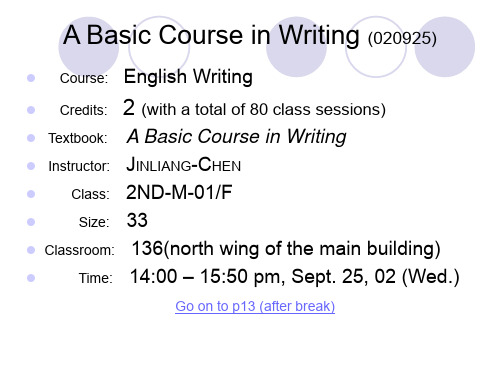
content is rather poor. (?3) Back
Do not make unnecessary or confusing shifts in person, number, tense, mood, and voice.
(Unity does not mean a writer can write only simple sentences.)
A long sentence expresses ideas that are closely connected. They are either
① A central idea supported or modified by various subordinate ideas, or
(The central idea: The explorer is writing reports on his adventures in the Antarctic.)
unity
Born in a small town in South China in the early 50s, he grew up to be a famous musician.
name on this sheet or paper. their names (person and number) He looks up difficult words in his dictionaries, and it
is very helpful. which is (person: wrong modifier/antecedent) She reviewed the lesson taught last week and all the
大学英语写作课件6-Effective-sentences

Байду номын сангаас
Examples
a. She decided to study English though she was interested in music. b. Although she was interested in music, she finally decided to study English.
Periodic sentence
Balanced sentences(平行句,对偶句)
When a sentence contains two parts of the same structure and roughly the same length, and with contrasted (or similar) ideas. It is a balanced sentence.
unity (一致性) coherence (连贯性) Conciseness(简洁性) Emphasis(强调性) Variety (多样性)
Unity(统一性)
A unified sentence means everything in the sentence should contribute to making one clear idea.
This is a long sentence with many parts, including two clauses. It has one central idea (the explorer is writing reports on his adventures in the Antarctic) and all the other ideas are related to this central idea.
英语写作基础教程第三版课后答案
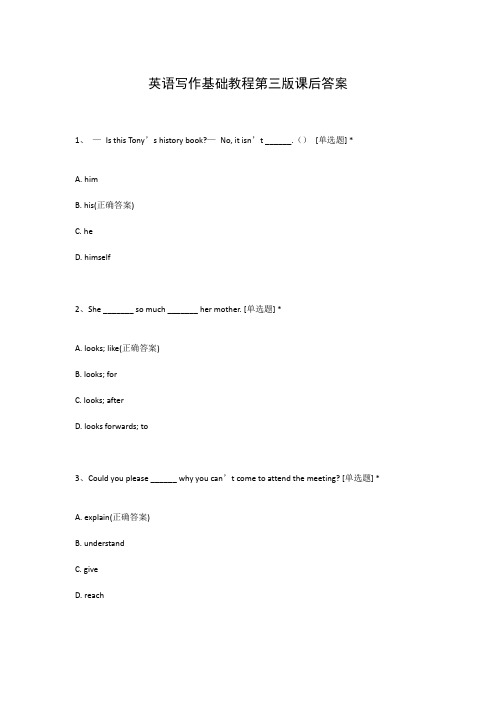
英语写作基础教程第三版课后答案1、—Is this Tony’s history book?—No, it isn’t ______.()[单选题] *A. himB. his(正确答案)C. heD. himself2、She _______ so much _______ her mother. [单选题] *A. looks; like(正确答案)B. looks; forC. looks; afterD. looks forwards; to3、Could you please ______ why you can’t come to attend the meeting? [单选题] *A. explain(正确答案)B. understandC. giveD. reach4、77.You can watch TV when you finish________ your homework. [单选题] *A.to doB.doC.to doingD.doing(正确答案)5、I’m still unable to make myself_____in the discussion, which worries me a lot. [单选题]*A.understandB.understood(正确答案)C.understandingD.to be understood6、The hall in our school is _____ to hold 500 people. [单选题] *A. big enough(正确答案)B. enough bigC. very smallD. very big7、--What would you like to say to your _______ before leaving school?--I’d like to say"Thank you very much!" [单选题] *A. workersB. nursesC. waitersD. teachers(正确答案)8、The news is?_______. We are all _______ at it. [单选题] *A. exciting;?excited(正确答案)B. excited;?excitingC. exciting;?excitingD. excited;?excited9、74.In England people drive________. [单选题] *A.on the left(正确答案)B.in the leftC.on leftD.in left10、--Whose _______ are these?? ? ? --I think they are John·s. [单选题] *A. keyB. keyesC. keys(正确答案)11、-Do you have tickets for Friday? -Sorry, we've got _____ left. [单选题] *A. eitherB. none(正确答案)C. no oneD. neither12、I’ve _______ a job interview today. [单选题] *A. haveB. had(正确答案)C. hasD. have gone to13、The Titanic is a nice film. I _______ it twice. [单选题] *A. sawB. seeC. have seen(正确答案)D. have saw14、Customers see location as the first factor when_____a decision about buying a house. [单选A.makeB.to makeC.making(正确答案)D.made15、One thousand dollars a month is not a fortune but at least can help cover my living(). [单选题] *A. billsB. expenses(正确答案)C. pricesD. charges16、_______ win the competition, he practiced a lot. [单选题] *A. BecauseB. In order to(正确答案)C. Thanks toD. In addition to17、Modern plastics can()very high and very low temperatures. [单选题] *A. stand(正确答案)B. sustainC. carryD. support18、Tomorrow is Ann’s birthday. Her mother is going to make a _______ meal for her. [单选题] *A. commonB. quickC. special(正确答案)D. simple19、Jack can speak Japanese, and his brother can _______ speak Japanese. [单选题] *A. tooB. also(正确答案)C. eitherD. as well20、( ) No matter _____ hard it may be, I will carry it out. [单选题] *A whatB whateverC how(正确答案)D however21、57.Next week will be Lisa's birthday. I will send her a birthday present ________ post. [单选题] *A.withB.forC.by(正确答案)D.in22、In winter, animals have a hard time_____anything to eat. [单选题] *A.to findB.finding(正确答案)C.foundD.to finding23、--What’s your _______, Jim Green?--Jim. [单选题] *A. full nameB. first name(正确答案)C. last nameD. family name24、Don’t read in bed. It’s _______ your eyes. [单选题] *A. good atB. good forC. bad atD. bad for(正确答案)25、In order to find the missing child, villagers _______ all they can over the past five hours. [单选题] *A. didB. doC. had doneD. have been doing(正确答案)26、______ in the library. ()[单选题] *A. Don’t smokingB. No smokeC. No smoking(正确答案)D. Doesn’t smoke27、--Miss Li, could you please help me _______ math problem?--OK. Let me try. [单选题] *A. look upB. work out(正确答案)C. set upD. put up28、Three ______ died of water pollution last winter. [单选题] *A. hundreds of villagersB. hundred villagers(正确答案)C. hundreds villagersD. hundred of villagers29、I don’t think he will take the case seriously,_____? [单选题] *A.don’t IB.won’t heC.does heD.will he(正确答案)30、These two films are very interesting. I like them _____. [单选题] *A. eitherB. neitherC. allD. both(正确答案)。
英语写作基础教程第三版
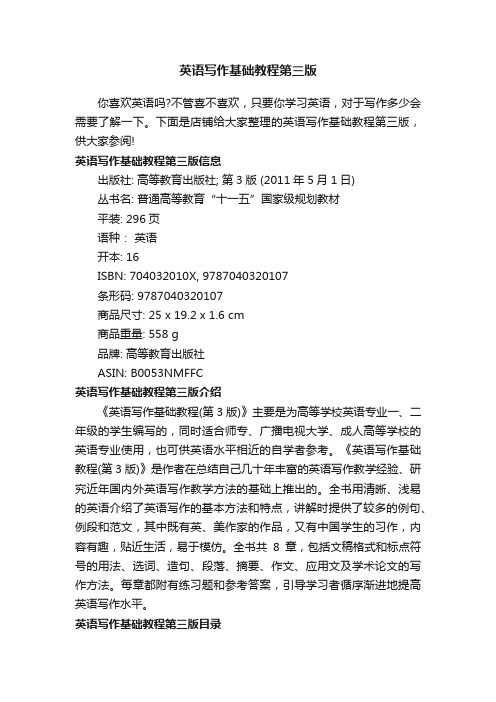
英语写作基础教程第三版你喜欢英语吗?不管喜不喜欢,只要你学习英语,对于写作多少会需要了解一下。
下面是店铺给大家整理的英语写作基础教程第三版,供大家参阅!英语写作基础教程第三版信息出版社: 高等教育出版社; 第3版 (2011年5月1日)丛书名: 普通高等教育“十一五”国家级规划教材平装: 296页语种:英语开本: 16ISBN: 704032010X, 9787040320107条形码: 9787040320107商品尺寸: 25 x 19.2 x 1.6 cm商品重量: 558 g品牌: 高等教育出版社ASIN: B0053NMFFC英语写作基础教程第三版介绍《英语写作基础教程(第3版)》主要是为高等学校英语专业一、二年级的学生编写的,同时适合师专、广播电视大学、成人高等学校的英语专业使用,也可供英语水平相近的自学者参考。
《英语写作基础教程(第3版)》是作者在总结自己几十年丰富的英语写作教学经验、研究近年国内外英语写作教学方法的基础上推出的。
全书用清晰、浅易的英语介绍了英语写作的基本方法和特点,讲解时提供了较多的例句、例段和范文,其中既有英、美作家的作品,又有中国学生的习作,内容有趣,贴近生活,易于模仿。
全书共8章,包括文稿格式和标点符号的用法、选词、造句、段落、摘要、作文、应用文及学术论文的写作方法。
每章都附有练习题和参考答案,引导学习者循序渐进地提高英语写作水平。
英语写作基础教程第三版目录Chapter 1 Manuscript Form and Punctuation1 Manuscript Form1. Arrangement2. Word Division3. Capitalization4. Handwriting2 Punctuation1. The Comma(,)2. The Period(.)3. The Semicolon(;)4. The Colon(:)5. The Question Mark(?)6. The Exclamation Mark(!)7. Quotation Marks("...")8. Parentheses / Brackets((...))9. Square Brackets([...])10. The Dash(——)11. The Slash(/)12. Underlining and ItalicsKeys for ReferenceChapter 2 Using Proper Words1 Types of Words2 Choice of Words3 SynonymsSome Good DictionariesKeys for ReferenceChapter 3 Making Correct and Effective Sentences 1 Correct Sentences1. Completeness in Structure2. The Right Subject3. Agreement Between the Subject and the Predicate Verb Chapter 4 Developing ParagraphsChapter 5 SummarizingChapter 6 Composing EssaysChapter 7 Writing for Practical PurposesChapter 8 Preparing Research Papers。
《英语写作》Effective Sentences

Part 1:Unity
• Original: Du Fu was one of the greatest poets.
(Incomplete idea)
• Revised : Du Fu was one of the greatest poets of the Tang dynasty of China.
人称、数、语态、时态或语气上混乱
Part 2:Coherence
Practice: Find out the faulty parts in the following sentences and try to revise them.
1. A man is judged not only by what he says but also by his deeds.
2. She told my sister that she was wrong. 3. She bought several picture books and put them into her
bag, which she intended to give to her children. 4. Looking out of the window, the grassland stretches as far
Q: What are the principles for effective sentences?
CONTENTS
01 Unity 02 Coherence 03 Emphasis 04 Conciseness 05 Variet 1:Unity
1. Unity 一致性、完整性 A unified sentence expresses a single complete thought. It does not contain ideas that are not closely related, nor does it express a thought that is not complete by itself.
(完整版)WritingEffectiveSentencesPart1
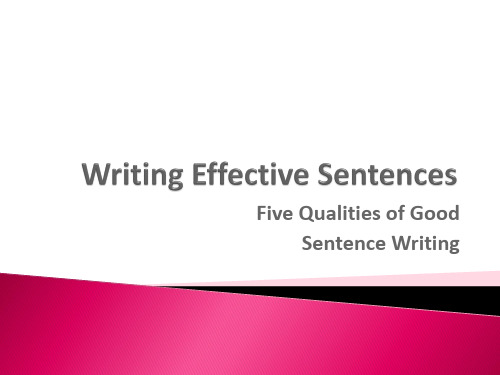
Coherence intro
Coherence – logical arrangement of all parts of a sentence.
◦ Word order.
Coherent sentences – meaning is clear, easy to understand.
With his vast experience and training, he became a great writer.
Unity 2nd example
Dream of the Red Mansions is the best known novel.
The sentence is not complete, “best known novel” needs to be modified.
Dream of the Red Mansions is the best known Chinese novel.
Dream of the Red Mansions is the best known novel in Chinese literature.
Unity sentences/paras
Coh. – pron. Unclear ref
Don’t use pronouns with unclear reference.
◦ Mary called Beth every day when she was in hospital.
Instead:
◦ When Mary was in hospital Beth called her every day.”
英语写作---lesson3--How to Write an Effective Sentence-2010-9
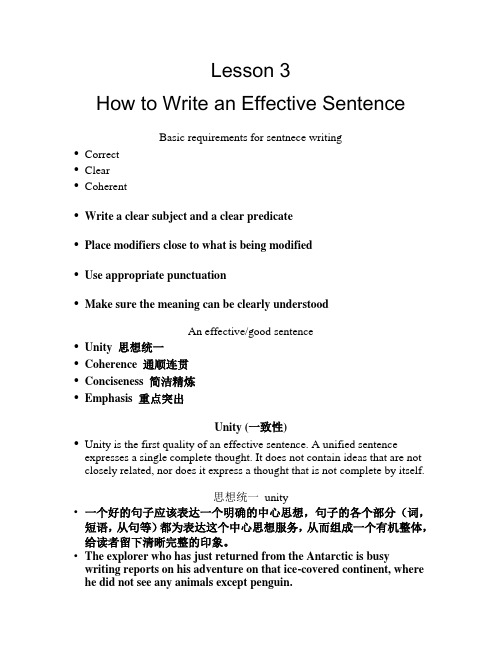
Lesson 3How to Write an Effective SentenceBasic requirements for sentnece writing•Correct•Clear•Coherent•Write a clear subject and a clear predicate•Place modifiers close to what is being modified•Use appropriate punctuation•Make sure the meaning can be clearly understoodAn effective/good sentence•Unity 思想统一•Coherence 通顺连贯•Conciseness 简洁精炼•Emphasis 重点突出Unity (一致性)•Unity is the first quality of an effective sentence. A unified sentence expresses a single complete thought. It does not contain ideas that are not closely related, nor does it express a thought that is not complete by itself.思想统一unity•一个好的句子应该表达一个明确的中心思想,句子的各个部分(词,短语,从句等)都为表达这个中心思想服务,从而组成一个有机整体,给读者留下清晰完整的印象。
•The explorer who has just returned from the Antarctic is busywriting reports on his adventure on that ice-covered continent, where he did not see any animals except penguin.•The explorer who has just got a divorce is busy writing reports on his adventure on that ice-covered continent, where he did not see any animals except penguin.•Example:I got up early. Mom told me that there was always traffic jam and our car was a little bit too old and we need buy a new one.•Revised:•I got up early Monday morning. Mom told me that there was always heavy traffic, and as our car was a bit old and. couldn't run fast,we’d better start earlier.Faulty:Born in a small town in South China in the early 50s, he grew up to be a famous musician.•Revised:He was born in a small town in South China in the early 50s. In his childhood he liked to sing songs. Later he entered a conservatory.In the 70s he became a famous musician.不统一造成的错误1. 句子结构不完整(sentence fragment):在结构上残缺,在意义上含糊,这种语病就是句子片断。
英语写作 Effective_sentences
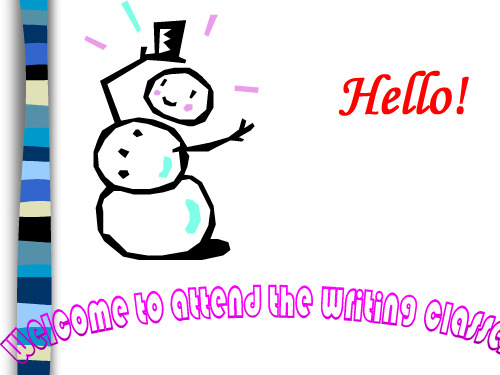
Correctness Unity
Clarity
Coherence
Emphasis
Variety
Correctness
Try to avoid : 1. Run-on sentences(不间断句子、逗 号谬误句子、串句) 2. Fragmentary sentences(破句、不完 整句子) 3. Faulty parallelism (错误平行结构) 4. Misplaced modifiers(错置修饰语) 5. Dangling modifiers(垂悬修饰语
Disconnected sentences
Born in a small town in South China in the early 50s, he grew up to be a famous musician. He was born in a small town in South China in the early 50s. In his childhood he liked to sing songs. Later he entered a conservatory(音乐学 院). In the 70s he became a famous musician.
Ann told her classmate Jane that she had won the first prize.
Ann told her classmate Jane, “ I have won the first prize.”
Ann told her classmate Jane, “ You have won the first prize.”
英语写作 Effectivesentences精品PPT课件

Choppy sentences
He found the kitchen window open. He put a ladder against the window. He climbed in. Finding the kitchen window open, he put a ladder against it and climbed in.
predicate The disagreement between the antecedent and the
reference pronoun The incorrect use of part of speech The wordiness The confusing shifts The vague reference
As the competition for college enrollment is extremely keen this year, the candidates spend days and nights preparing for the entrance examinations, neglecting their health. In view of this, the newspapers carry articles urging teachers and parents to take up this problem seriously.
My best friend at university was our English teacher. Her name was Wang Ping. She taught us English for two years. My best friend at university was our English teacher, Wang Ping, who taught us for two years.
【英语写作技巧】Chapter 3.Effective Sentences
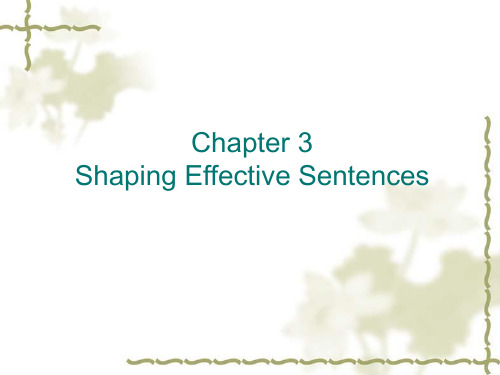
5. Avoid shifts among the indicative, imperative and subjunctive moods.
It is therefore an important part of the park ranger’s duty to watch the tourists and above all don’t let anyone try to feed the tigers.
Ways to achieve sentence coherence
1. Use parallel structures, which include: Her office is small, chilly and dirty( P.Adj.) I enjoy football and hockey. (PN.) Our dog ran across the lawn and under the hedge.
Most businesses see 1990 law as fair, but some opponents have exaggerated the costs of applying.
3. Cut or shorten empty words or phrases. 1) substitute at all times- always
Combine sentences by subordinating
Coherence
Coherence means that all parts in a sentence are connected in a smooth and logical order. In other words, the meaning of most of sentences depends on word order; therefore the position of different parts in a sentence is very important to clear communication.
英语写作---lesson3--How to Write an Effective Sentence-2010-9

Lesson 3How to Write an Effective SentenceBasic requirements for sentnece writing•Correct•Clear•Coherent•Write a clear subject and a clear predicate•Place modifiers close to what is being modified•Use appropriate punctuation•Make sure the meaning can be clearly understoodAn effective/good sentence•Unity 思想统一•Coherence 通顺连贯•Conciseness 简洁精炼•Emphasis 重点突出Unity (一致性)•Unity is the first quality of an effective sentence. A unified sentence expresses a single complete thought. It does not contain ideas that are not closely related, nor does it express a thought that is not complete by itself.思想统一unity•一个好的句子应该表达一个明确的中心思想,句子的各个部分(词,短语,从句等)都为表达这个中心思想服务,从而组成一个有机整体,给读者留下清晰完整的印象。
•The explorer who has just returned from the Antarctic is busywriting reports on his adventure on that ice-covered continent, where he did not see any animals except penguin.•The explorer who has just got a divorce is busy writing reports on his adventure on that ice-covered continent, where he did not see any animals except penguin.•Example:I got up early. Mom told me that there was always traffic jam and our car was a little bit too old and we need buy a new one.•Revised:•I got up early Monday morning. Mom told me that there was always heavy traffic, and as our car was a bit old and. couldn't run fast,we’d better start earlier.Faulty:Born in a small town in South China in the early 50s, he grew up to be a famous musician.•Revised:He was born in a small town in South China in the early 50s. In his childhood he liked to sing songs. Later he entered a conservatory.In the 70s he became a famous musician.不统一造成的错误1. 句子结构不完整(sentence fragment):在结构上残缺,在意义上含糊,这种语病就是句子片断。
大师傅写作教程之Effective Sentences

IntroductionThere are five characteristics of English effective sentences and they are Unity, Coherence, Conciseness, Emphasis, and variety. The big master(大师傅)is going to illustrate the five characteristics one by one in great detail.UnityUnity is the first quality of an effective sentence. A unified sentence expresses a single complete thought. It does not contain irrelevant ideas, not does it express a thought that is not complete by itself.Faulty: Born in Chengdu in the 1990s, big master became Cathy’s English teacher when he grew up.The above sentence has no unity at all and the two parts of the sentence are not logically connected, for there is not logical relationship between being born in Chengdu and becoming Cathy’s English teacher.Revised:Faulty: Although 1 hour late, he can not find the beautiful girl anywhere.The above sentence has no unity either, for being late has nothing to do with that he can not find the beautiful girl.Revised:Faulty: Born in spring, he fell in love with her at the first sight.Revised:CoherenceCoherence means clear and reasonable connection between the different parts of a sentence. An incoherent sentence has faulty parallel constructions, pronouns with ambiguous references, dangling or misplaced modifiers, confusing shifts in person and number, or in voice, tense, and mood.Faulty: A man is judged not only by what he says but also by his deeds.Revised:Faulty: Actions speak louder that what one says.Revised:Faulty: we thought that she was charming, intelligent, and a very capable young woman.Revised:Faulty: we have great faith and high hopes for her.Revised:Conclusion:Parallel ideas had better be expressed in parallel constructions, which give emphasis, clarity and coherence to a sentence, which is why those sentences are considered incoherent.。
英语写作基础教程
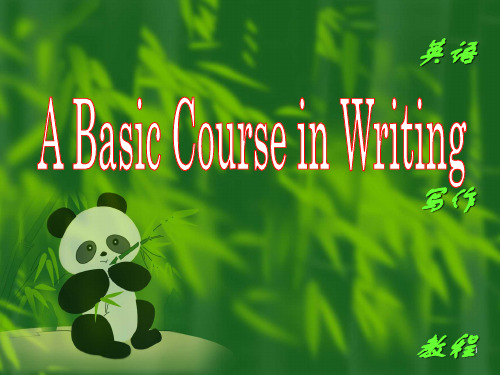
英语
写作
教程
1
Chapter I Using Proper Words
I. Using words correctly II. Using words accurately
2
I. Using words correctly 1.overcome Chinglish
11
● Different
connotation reflects the different attitude of the speaker. Complimentary derogatory Public servant bureaucrat Financier speculator Law officer cop Captain of industry tycoon Investigator spy Captive jailbird
7
1. Specific and concrete words
Specific and general A good man : kind / honest / just / generous / sympathetic / warm-hearted / selfless / honorable Good food: tasty / nourishing / rich / wholesome / high-priced / fresh / substantial
4
2. Beware of archaisms, obsolete words, and newly-coined words newly●Words or meaning of words which are no longer in common used but occur in special text (e.g. Religious works) and poetry are called archaic. Eg: mayhaps (v.hope; adv.maybe), quoth (vt.say), thy (pron. your), ere (prep. before) ● Words or meaning which have gone out of use altogether are called obsolete. Eg: admirable[废语]令人惊奇的 fine n. [废语]惩罚,处罚;为接受惩罚支付的钱 ● Newly-coined words Eg: junior-high-schooler, tube-steak, water-sensitive-crops, snow-poor-winter, …
- 1、下载文档前请自行甄别文档内容的完整性,平台不提供额外的编辑、内容补充、找答案等附加服务。
- 2、"仅部分预览"的文档,不可在线预览部分如存在完整性等问题,可反馈申请退款(可完整预览的文档不适用该条件!)。
- 3、如文档侵犯您的权益,请联系客服反馈,我们会尽快为您处理(人工客服工作时间:9:00-18:30)。
Do not use different forms to express parallel ideas. E.g. Do not make unnecessary shifts in person and number, and the voice, tense or mood of verbs. E.g.
(Unity does not mean a writer can write only simple sentences.)
A long sentence expresses ideas that are closely connected. They are either ① A central idea supported or modified by various subordinate ideas, or ② Two or more related parallel ideas. e.g. The explorer who has just returned from the Antarctic is busy
Go on to p13 (after break)
Textbook: Instructor:
Class:
Size:
Classroom: Time:
Effective Sentences
Aim: Qualities of an effective sentence and ways to achieve effectiveness. Correctness alone cannot make a good sentence because it may not express the idea it intends to express very clearly or forcefully. It has to be effective at the same time.
Do not make unnecessary or confusing shifts in person, number, tense, mood, and voice.
Students should learn to analyze and solve problems independently. Don’t rely on your teachers’ help. They should not rely on their teachers’ help. (mood) Those who want to join the chorus should sign your name on this sheet or paper. their names (person and number) He looks up difficult words in his dictionaries, and it is very helpful. which is (person: wrong modifier/antecedent) She reviewed the lesson taught last week and all the exercises assigned by the teacher were done. did all the exercises assigned by the teacher. (person)
writing reports on his adventures on that ice-covered continent, where he did not see any animals except penguins.
(The central idea: The explorer is writing reports on his adventures in the Antarctic.)
① ② ③ ④ ⑤
Qualities of an effective sentence:
Unity Coherence Conciseness Emphasis Variety
Unity
Unity means that ① there is only one main idea in a sentence; and that ② that idea is complete.
Do not use different forms to express parallel ideas.
A man is judged not only by what he says but also by his deeds. A man is judged not only by his words but also by his deeds. (?1) We thought she was charming, intelligent, and a very capable young woman. We thought she was charming, intelligent, and very capable. (?2) We have great faith and high hopes for her. We have great faith in and high hopes for her. This composition is quite good as far as the use of language is concerned, but its content is poor. The language of this composition is quite good but its content is rather poor. (?3) Back
unity
Born in a small town in South China in the early 50s, he grew up to be a famous musician. (The two parts of the original sentence are not logically connected, because a man born in a small town in South China in the early 50s would not necessarily become a famous musician. ) He was born in a small town in South China in the early 50s. In his childhood he liked to sing songs. Later he entered a conservatory. In the 70s he became a famous musician. Dream of the Red Mansions is the best-known novel. (This seems to be a correct sentence, but its meaning is not complete. “The best-known novel” should have been modified.) Dream of the Red Mansions is one of the best-known classical Chinese novel. Of all written before the 20th century Dream of the Red Mansions is perhaps the most popular. #
Do not make unnecessary or confusing shifts in person, number, tense, mood, and voice.
The explosion destroyed the building and a number of people were injured. The explosion destroyed the building and injured a number of people. (person) (?1: voice agreement) In the explosion the building was destroyed and a number of people injured. (voice) A lot of higher houses were built around hers in the past few years and she gets no more sunlight. A lot of higher buildings have been built around hers in recent years and as a result she gets no more sunlight. (tense) (?2: in any other way?) A lot of higher buildings were built around hers and as a result she got no more sunlight. (tense) # Back
I read an interesting story in a magazine about sportsmen. I read in a magazine an interesting story about sportsmen. In a magazine I read an interesting story about sportsmen. The idea he mentioned at first sounded good. The idea he first mentioned sounded good. The idea he mentioned sounded good at first. He gave a reason for not attending the meeting, which nobody believed. He gave a reason, which nobody believed, for not attending the meeting. He gave a reason for not attending the meeting, a reason which nobody believed. Back
